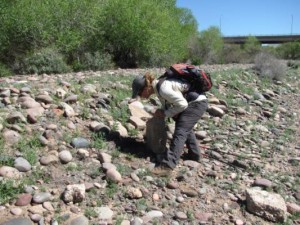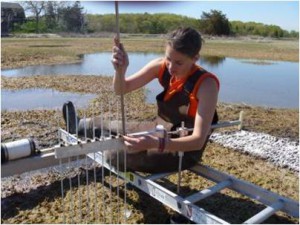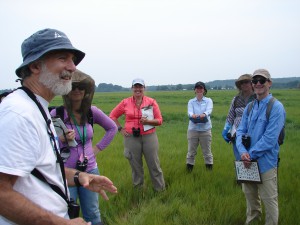The original blog post can be found on the KBS LTER website here.
Each year the KBS LTER program awards graduate students summer fellowships. Here Elizabeth Schultheis and Melissa Kjevik, now both postdoctoral researchers with Michigan State University, describe the project their summer fellowship supported.
Today it is apparent that students and the public continue to struggle when faced with data and its interpretation. When asked to make sense of data taught in their science classrooms, gathered during classroom inquiry projects, or found in the news, students are unable to connect quantitative information to explanations of the way the world works. Without exposure and practice, a large dataset or complicated graph can seem insurmountable. In collaboration with K-12 teachers, the Kellogg Biological Station (KBS) GK-12 program, BEACON, and the LTER, we created Data Nuggets to help students overcome roadblocks when working with and interpreting data.
Data Nuggets are targeted classroom activities focused on developing quantitative skills for K-16 students. They are created from recent and ongoing research, bringing cutting edge science into the classroom and helping scientists share their work with broad audiences. The standard format of each Data Nugget provides background information about a scientist and their research, along with how they became interested in their research questions and system that they study. Each Data Nugget includes a real dataset for students to graph, interpret, and use to construct an explanation.

Scientist Mélanie Banville searching for reptiles in the Central Arizona-Phoenix LTER. Her and Heather Bateman’s Data Nugget, “Lizards, Iguanas, and Snakes! Oh My!”
LTER Data Nuggets
The collaboration between Data Nuggets and the LTER is a mutually beneficial fit. LTER scientists help strengthen the Data Nuggets project by increasing the diversity of data and research available to students. In turn, Data Nuggets provide an avenue for LTER scientists to share their work and findings with a broad audience of students, teachers, and fellow scientists. Sharing research findings with the non-science public is an important part of the science process, yet is often one of the most challenging to achieve. With broader impacts a factor in most grants, finding effective methods of communication and transmission is key. Researchers who create Data Nuggets must dig deep to uncover the core messages of their research and think back to the big question that got them passionate about the research in the first place. Also, by creating a Data Nugget and practicing communicating research to a 6th grader, scientists can rest assured that at their next conference they’ll be better able to discuss their work with collaborators and those outside their field!

Researcher Sam Bond taking Sediment Elevation Table measurements in Plum Island Ecosystems Long Term Ecological Research site. For more information on this research, check out Anne Giblin’s Data Nugget, “Keeping Up With the Sea Level”.
Most importantly, a great outcome of using LTER data to create Data Nuggets is that teachers and students will directly benefit from additional resources that highlight the importance of data and science in an authentic context. Activities aiming to improve quantitative skills are more effective if they’re grounded in real world situations that students can relate to. Connecting science to a student’s experiences and local ecosystems makes the content more accessible, particularly for culturally and linguistically diverse students. These connections also allow students to envision a place for themselves in science. To assist with place-based learning, each Data Nugget is categorized and searchable by the location where the study occurred, allowing teachers to connect data to their students’ environment. In this way, LTER Data Nuggets have the potential to increase interest and engagement with science and data, in both students and the public.

Robert Buchsbaum, from Mass Audubon, preparing his team for a morning of salt marsh bird surveys. Find out more about his research on the endangered Saltmarsh Sparrow in his Data Nugget, “Does Sea Level Rise Harm Saltmarsh Sparrows?”
Working with LTER Scientists and Educators
This past summer (2015), we received support from the LTER Summer Fellowship program. This support allowed us to continue our work with Data Nuggets, and to strengthen their connection to the vast stores of data available through the LTER, including the KBS site and the other 24 sites in the LTER Network. While the LTER Network has conducted over three decades of amazing research, spanning diverse ecosystems and taxa, LTER education and outreach specialists are still finding creative new ways to share this important research with the public. Data Nuggets can breath new life into long-term
datasets, opening them up to the public and future scientists. These funds were used to support training workshops at the LTER All Scientists Meeting (ASM) in Estes Park, CO in August and at KBS in July. These two workshops supported early and late career scientists (graduate students, postdocs, faculty, and REUs) and many LTER education and outreach specialists looking to broaden the impact of the LTER’s research and improve their communication skills. In addition, at the LTER ASM we participated in a poster session to reach out to those who were unable to attend our workshop. Our outreach efforts strengthened the connection between Data Nuggets and the LTER, and resulted in the creation of nine (and counting!) new Data Nuggets based on LTER research. Additionally, in August, we spoke to the teachers working with the KBS K-12 Partnership, connecting them with the LTER Data Nuggets and the vast pool of LTER data, freely available online.
When reflecting back on this summer, it was so great to work with a diversity of LTER scientists across the network. We enjoyed learning new science stories and are very happy to now include coastal, urban riparian, and other ecosystems in the Data Nuggets collection. Please feel free to contact Melissa or Elizabeth if you would like more information or to get started creating your own Data Nugget! For a list of all the Data Nuggets created by LTER scientists and outreach leaders, click here!

